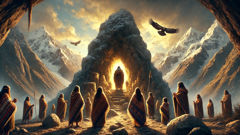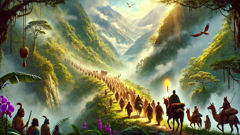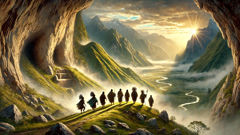Introduction
In the cradle of the Andes, where rugged peaks cut sharp silhouettes against a sky both infinite and intimate, the roots of a great civilization burrow deep into legend. The ancient Inca believed their world began not in silence but in the echoing heart of a cave: Pacaritambo, the place of origin. The wind there carried stories on its breath, and the earth itself seemed to listen as the first people stepped out from darkness into dawn. From this cave, high above the clouds, emerged four brothers and their four sisters—eight figures both mortal and divine, each bearing the hopes and fears of an unborn empire. They were the Ayar siblings: Ayar Manco, Ayar Cachi, Ayar Uchu, Ayar Auca, and their sisters Mama Ocllo, Mama Huaco, Mama Ipacura, and Mama Raua. These names still echo in the valleys and on the lips of those who remember the first journey. Their mission was set by the sun god Inti himself: to search for fertile land where their people could flourish, to found a city at the navel of the world. The path would be neither simple nor safe. Each step out of Pacaritambo brought new landscapes—fields veiled in morning mist, forests thick with secrets, rivers silvering through ancient stones. But more daunting still were the shadows cast by their own doubts and ambitions. The Ayar brothers and their sisters would meet not only the wild spirits of the land but also the turbulent spirits within themselves. The stones they walked upon would remember every promise and every betrayal. Their journey would become legend, shaping the very heart of Tawantinsuyu—the Inca Empire—and setting the stones of Cusco, a city whose walls still whisper of myth and memory. This is their story, told not just in monuments and ruins, but in the enduring pulse of a people who still look to the mountains and recall the dawn.
The Cave of Beginnings: Pacaritambo’s Sacred Promise
On a morning when the world seemed newly born, the darkness within Pacaritambo shuddered as if stirred by an ancient breath. Deep within, Ayar Manco felt the pulse of destiny, a gentle insistence that time had come for their emergence. He was eldest among brothers, shoulders broad and eyes deep as obsidian pools. His brothers—Ayar Cachi, fierce and proud; Ayar Uchu, quiet and patient; Ayar Auca, restless as the wind—stood close, each bearing the distinct weight of expectation. The sisters, too, were formidable: Mama Ocllo, wise beyond years; Mama Huaco, a warrior’s spirit in a slender frame; Mama Ipacura, gentle and observant; Mama Raua, nurturing yet strong.

The cave’s air was thick with the scent of damp earth and ancient minerals. Their exit was no ordinary birth. It was ritual, woven with prayer and song. The siblings stepped into the pale light with hearts pounding, their first sight the tapestry of mountains rolling toward the horizon. The world outside seemed impossibly vast. Stone and sky, grass and river—each element felt alive, humming with possibility and warning.
Ayar Manco led, holding a golden staff gifted by Inti, the sun god. With each stride, his staff pierced the ground and left small eruptions of energy in its wake. The people who followed—their kin and early companions—watched in awe, believing the staff would guide them to their destined land. Yet from the beginning, tension simmered. Ayar Cachi’s pride was sharp as a blade, his laughter booming with hidden menace. He boasted of powers to topple mountains, and his siblings worried he might sow discord before they reached their goal.
Beyond the cave’s mouth, forests grew thick with vines and orchids, birds flashed like living jewels through shifting leaves, and rivers sang ancient songs. Their journey began with hope, yet already each sibling felt the weight of prophecy. As they moved forward, following the contours of the land, they found villages whose people gazed at them with both curiosity and fear. They brought stories of origin, tales of emergence from the mountain womb—tales that rooted in the hearts of those they met. At night, fires flickered beneath constellations as old as memory. The siblings huddled close, sharing warmth and plans, wary of the cold and of each other’s ambitions.
One evening, as mist curled low and stars winked above, Mama Huaco spoke: “We must stay united. The land tests us, but so do our own shadows.” Her words lingered like incense. Yet, even as they resolved to keep peace, fate brewed trials not only in wild places, but in the silent places between hearts.
Days passed and the landscape grew steeper. The siblings pressed on through bamboo groves and high puna grasslands, past herds of llamas grazing beneath condors in flight. Each dawn brought a new vista, and with it, new doubts. Would they recognize their promised land when they saw it? Would Inti’s staff truly signal the navel of the world? These questions pulsed through their dreams.
Their first true test came as they entered a valley rimmed by cliffs and dotted with ancient burial towers. Here, Ayar Cachi’s power grew restless. He struck stone with his sling, splitting boulders and causing tremors that sent birds shrieking into the dusk. Local villagers, terrified by this display, begged Ayar Manco to protect them. He knew that Cachi’s strength, unchecked, could destroy not only enemies but friends.
That night, as wind howled through the valley, a plan formed among the siblings. With heavy hearts, they decided Ayar Cachi must remain behind—trapped in a cave so his fury could not bring ruin. Ayar Cachi sensed betrayal, yet Ayar Manco’s resolve was unyielding. They led Cachi to a sacred cave under pretense of ritual, sealing him inside with stones and whispered prayers. The cave shuddered; thunder rolled through the ground, as if the earth itself mourned or raged at this loss. The siblings wept, not just for a brother left behind, but for innocence broken in pursuit of destiny.
From this sacrifice, they learned unity was not always gentle—it sometimes demanded hard choices. The journey pressed on, but the shadow of the cave clung to each step. The Ayar siblings moved forward, carrying with them the memory of what was lost, determined to forge a future from both sorrow and hope.
Trials Across the Andean Heartland
Leaving the valley haunted by Ayar Cachi’s absence, the remaining siblings pressed onward. Their followers grew weary, but hope clung to them like morning dew. Ayar Manco’s golden staff guided their way, yet the earth often seemed to resist their progress—dense forests twisted their paths, rivers raged swollen by hidden rains, and each new valley brought its own spirits and omens.

Mama Ocllo became their anchor, her wisdom softening disputes and soothing anxious hearts. She taught the followers how to weave sturdy cloaks from alpaca wool and purify water from mountain streams. Mama Huaco, fierce and determined, took up a spear, leading scouting parties and fending off jaguars that prowled the night. Mama Ipacura and Mama Raua tended the sick and comforted children, their songs weaving safety in the dark. The journey was long and marked by hardship, yet the Ayar siblings’ unity became a beacon for their people.
Ayar Uchu found his patience tested by the slow grind of progress. One morning, he wandered ahead of the group to scout a crossing. In a secluded grove, he heard whispers—ancient voices rising from mossy stones. The voices offered him power and solitude, promising greatness if he struck out alone. Uchu hesitated, feeling the pull of both ambition and loyalty. When he returned to camp, he spoke nothing of his encounter, but a shadow crossed his brow that didn’t fade for many days.
Meanwhile, Ayar Auca’s restlessness brought new trials. He pushed the group onward through lands claimed by rival tribes, negotiating tense truces when possible, brandishing spear and words alike. Once, when a chieftain refused passage, Auca challenged him to a contest of strength and skill. Under watchful eyes, Auca lifted boulders and ran swift as the mountain deer. Victory earned them a safe path but left bruises on Auca’s pride—he longed for glory, yet felt overshadowed by Manco’s steady leadership.
Through dense cloud forests where orchids dripped from twisted limbs and hummingbirds flashed like emeralds, the siblings pressed on. They encountered people who feared them and others who hailed them as emissaries of the gods. With each new settlement, tales of their deeds spread—stories embroidered by awe and suspicion. Some called them bringers of fortune; others warned of destruction in their wake.
The golden staff of Inti remained their guide. Yet, whenever they paused to test the soil, to see if the staff would sink effortlessly—as prophecy foretold—they found only resistance. The ground in each place was too hard, too rocky, too shallow. Disappointment grew, yet Mama Ocllo urged patience. “The earth speaks slowly,” she said. “When our home reveals itself, we’ll know.”
One evening, as they camped beneath a sky streaked orange and violet, a tempest rose in the east. Wind lashed the tents, lightning clawed at distant peaks, and thunder rolled through the earth like the memory of Ayar Cachi’s rage. The siblings gathered close, sheltering their people, singing prayers to Inti and Pachamama, the earth mother. Through storm and shadow, they clung to faith—not just in prophecy, but in each other.
With dawn came calm, and a rainbow arched across the sky. The siblings took this as a sign to continue. They traversed high passes where snow lingered year-round and valleys carpeted with wild potatoes and maize. The land was both adversary and ally; sometimes its bounty sustained them, sometimes its cold and hunger nearly broke them. Yet, each hardship forged new strength.
The journey transformed them all. Manco’s leadership grew tempered by loss; Ocllo’s wisdom deepened; Huaco’s courage became legend; Uchu’s patience held even as he questioned his place; Auca’s hunger for recognition matured into genuine care for their people. The landscape itself shaped their story, carving lessons into their bones with every step.
The Navel of the World: Founding Cusco
Days blurred into weeks, weeks into months. The journey seemed endless, but the Ayar siblings pressed forward, each day a silent vow to those who followed. They passed through sacred lakes where reeds whispered secrets, and crossed fields dotted with wildflowers the colors of fire and sunlight.

One morning, as the sun crested the mountains and painted the sky with gold, Ayar Manco halted on a high ridge overlooking a wide valley. Below, two rivers wound together like serpents, their waters glinting. The earth here felt different—softer, welcoming. Manco knelt and pressed the golden staff into the soil. For the first time, it slid in effortlessly, sinking deep as if the land itself drew it home. The staff stood upright, trembling with light.
A hush fell. The siblings and their followers stared, hearts pounding. The prophecy had spoken: this was the navel of the world—Qosqo, or Cusco. Cheers rose and tears spilled as the weary travelers fell to their knees. Mama Ocllo gathered a handful of earth and let it sift through her fingers; Mama Huaco raised her spear in salute to the sky.
But before they could claim their new home, they faced one final trial. Ayar Uchu, haunted by his earlier visions, saw ghostly figures moving at the edge of the valley—spirits who challenged the siblings’ right to settle here. That night, in dreams rich with starlight and trembling shadows, Uchu walked into the darkness alone. He confronted the spirits, who demanded sacrifice for passage into this sacred place. Uchu offered his own transformation, vowing to serve as guardian of Cusco for eternity. By dawn, he was gone—his spirit fused with a great stone pillar overlooking the valley, his gaze forever watching over the people he loved.
Ayar Auca, too, felt destiny’s call. As settlements began to rise—foundations laid from stone and mud—Auca circled the valley, ensuring no rival tribes threatened their peace. His wanderings became legend; some say he transformed into a great bird, soaring above Cusco as protector. The siblings mourned Uchu and Auca’s transformation but understood that greatness demands sacrifice.
With Ayar Manco and the sisters now leading, construction began in earnest. Mama Ocllo organized planting of maize and potatoes; she taught weaving and pottery. Mama Huaco oversaw defense and trained warriors, her reputation spreading quickly. Mama Ipacura tended gardens and ceremonies, while Mama Raua became the heart of the community, helping all feel at home.
Ayar Manco, now known as Manco Capac, became the first Sapa Inca. He led with wisdom drawn from hardship, ruling not as a king set apart but as a brother who had walked every mile alongside his people. Under his guidance, Cusco grew from scattered huts into a city of plazas, temples, and terraced fields that shimmered in the sun. The siblings’ legacy was woven into every wall and every festival.
The city thrived. People came from distant valleys to join in its promise. They carried stories of emergence from darkness—of Ayar Cachi’s power and sacrifice, of Ayar Uchu’s silent watch, of Auca’s restless protection, and of the sisters’ steady hands building a new world. The Ayar siblings lived on in memory and ritual; their journey retold each year during festivals when the golden staff was paraded through Cusco’s streets.
In time, the Inca Empire would expand far beyond Cusco’s valley—yet at its heart remained the lesson of Pacaritambo: that greatness is forged by unity, sacrifice, and hope. The stones of Cusco, fitted so precisely that centuries cannot pry them apart, still echo with the footsteps of those who first dreamed a city from the soil.
Conclusion
The story of the Ayar Brothers and their sisters is etched into the very bones of Peru. More than just an origin myth, it’s a chronicle of perseverance, sacrifice, and vision—a reminder that every journey demands not only courage but also compassion and unity. Cusco still stands as testament to their determination, its stones whispering tales to those who pause and listen. Every winding street and sunlit plaza carries echoes of their laughter, tears, and hopes. The lessons are clear: greatness is not born of power alone but from the willingness to endure hardship together and to honor both triumphs and losses. In the enduring heart of the Andes, where earth and sky meet, the Ayar siblings’ journey continues—alive in memory, tradition, and the living pulse of a people who once stepped from darkness into dawn.













